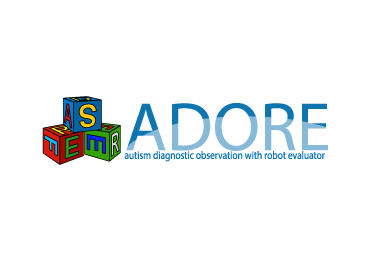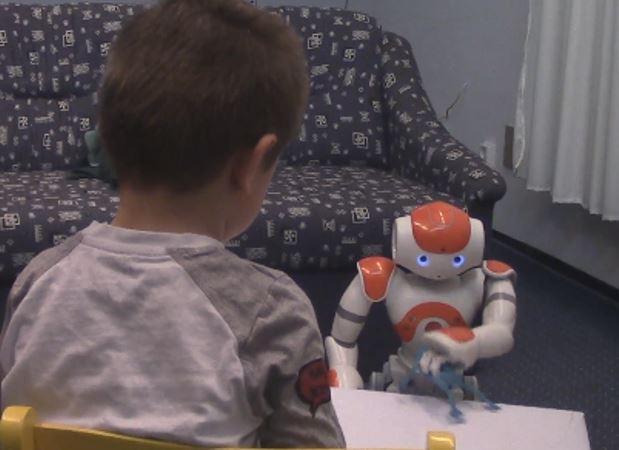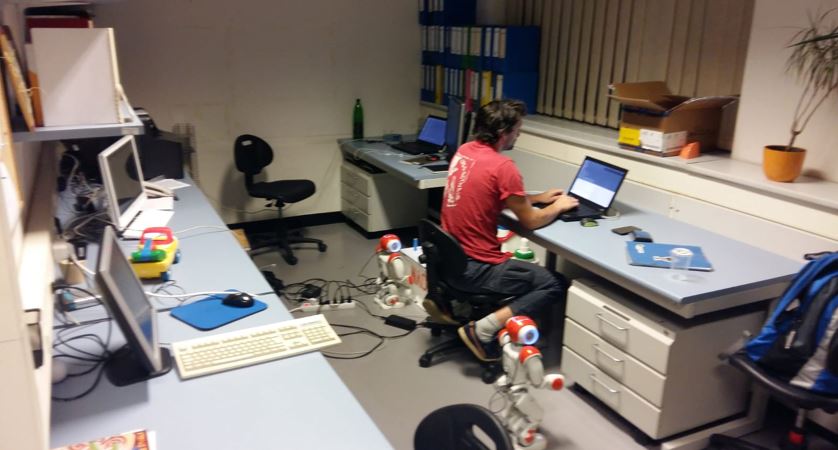 Project name: Autism Diagnostic Observation with Robot Evaluator
Project name: Autism Diagnostic Observation with Robot Evaluator
Project acronym: ADORE
Dates: 01.09.2014 - 31.08.2018
Total budget: 1,000,000.00 HRK
Funding: Croatian Science Foundation (HRZZ)
Project Number: 93743-2014
ADORE
The main goal of the ADORE project is the development of a robot-based diagnostic protocol and validation of a robotic diagnostic assistant in clinical settings. The robots are used as ASD co-evaluators to help a human evaluator to assess a child's behavior objectively. To the best of our knowledge, such a robot-based ASD diagnostics system is the first of its kind.
The robot-assisted ASD diagnostic protocol consists of four tasks and is based on the Autism Diagnostic Observation Schedule (ADOS) which is considered to be the “golden standard” of ASD diagnostics. Within the tasks, the robot observes social cues such as eye contact, verbal activity and ability to imitate. Since our goal was to make the robot as autonomous as possible, we modelled the tasks using the Mixed Observability Markov Decision Processes (MOMDPs), which enables the robot to infer the information about the child and control task execution autonomously. On the protocol level, we use the standard Partially Observable Markov Decision Process (POMDP) model which enables the robot to choose tasks of the protocol autonomously and combine observations from tasks into a final assessment of a child’s behavior.
NAO robot demonstrates frog jumping gestures to the child
Preparing the robots for a session at the Child Communication Research Laboratory
Clinical trials are performed at the Child Communication Research Laboratory, which is located at the Croatian Institute for Brain Research. During various development stages, more than 50 children have been introduced to the robot. Fifteen of them (7 developing typically, 8 with ASD) were a part of the latest study which showed that, given perfect observations of social cues, our robots are capable of identifying the behavior of the child.
Project partners:
- University of Zagreb, Faculty of Electrical Engineering and Computing (HR)
- University of Zagreb, Faculty of Education and Rehabilitation Sciences (HR)
Our professor Zdenko Kovačić attended the 26th International Conference on Software, Telecommunications and Computer Networks (SoftCOM 2018), which was held in Supetar-Split, Croatia, where he presented the paper entitled “Object Classification for Child Behavior Observation in the Context of Autism Diagnostics Using a Deep Learning-based Approach”. The paper brought to attention the results of a LARICS student, Mihael Presečan, which demonstrate the effectiveness of a deep learning approach for object detection and classification using a mono-vision feedback of a NAO humanoid robot for assessing a child’s behavior during free play with standardized toys, which is one of the tasks contained in the standard ADOS-2 autism spectrum disorder diagnostic protocol used by clinicians.




